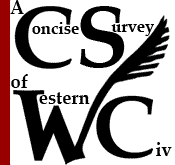Primary Sources for Chapter 8
The Medieval Mêlée: The High and Later Middle Ages, 1000 to 1500
Study Guide | Art History | Links
William the Conqueror according to The Anglo-Saxon Chronicle: a portrayal of the new King of England.
Content Question: What details show William’s method of rule?
Analysis Question: How does this description show both positive and negative aspects of Wiliam?
Evaluative Questions: How does William compare to other rulers (e.g. Hammurabi, Cyrus, Julius Cæsar, Augustus, Charlemagne, Louis XIV, or Napoleon)?
Life of St. Bernard (You only have to consider the first life, not the one beginning “From the Acta Sanctorum of Arnold...,” although it is interesting): a description of the alternative lifestyle of disciplined Cistercian monks.
Content Question: What words describe the monastic life and the Christian faith?
Analysis Question: How do Bernard and his fellow monks organize their way of life?
Evaluative Questions: Why would anyone find this way of life so attractive?
Gregory VII’s Dictatus Papæ: The papal declaration of supremacy.
Content Question: What specific points which infringe on imperial political authority?
Analysis Question: Which provisions were valid then, at some point in the past, and/or today?
Evaluative Questions: How do such claims reflect Christian values or not?
Peter Abelard, Sic et Non, Introduction: an explanation of why it us useful to ask questions even of Holy Scripture.
Content Question: What examples does Abelard cite of scripture being questioned in the past?
Analysis Question: According to Abelard, what can happen if we do not doubt and question?
Evaluative Questions: Can authorities guarantee that only approved answers will result from doubting?
The Conversion of Peter Waldo: the story of how the Waldensian heresy began.
Content Question: What actions describe Peter’s conversion?
Analysis Question: How does his story reflect the growing wealth from urban life?
Evaluative Questions: How can society balance the desire for wealth with the demands of Christian charity?
The Black Death, described by Boccaccio: an eye-witness survivor describes the plague in Florence.
Content Question: What were the four varying reactions to the plague?
Analysis Question: How did society not entirely break down?
Evaluative Questions: How would people react today to such a catastrophe?
See also:
ORB Text Library: Translations and Transcriptions: several medieval texts of interest, including Gesta Normannum and Deeds of Arms
Online Medieval and Classical Literature Library: many medieval sagas and romances.
Primary Source Project Links
8. Pope Gregory VII and King Henry IV about Church versus State



